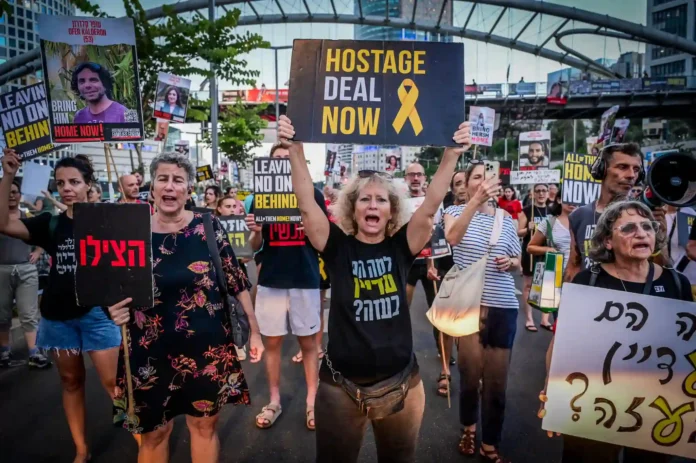Doha, Qatar – In a significant development, Hamas has dropped its demand for an upfront pledge that Israel ends the war, a move that prompted Israeli Prime Minister Benjamin Netanyahu to send a delegation led by Mossad Director David Barnea to Doha for further negotiations.
This shift has rekindled hopes for a breakthrough in the long-stalled talks aimed at securing the release of the remaining 120 hostages and achieving a Gaza ceasefire.
Netanyahu communicated this new development to US President Joe Biden, indicating that Israel is prepared to engage in discussions based on the latest draft of a three-phase deal received on Wednesday.
This proposal, which has been in the works since a contentious plan unveiled by Biden on May 31, includes the release of hostages and discussions on a permanent ceasefire.
Despite the progress, Hamas is still expected to seek a commitment to a permanent ceasefire, potentially even before the completion of the first phase of the deal.
However, the group’s willingness to proceed with the initial phase without such a pledge marks a significant shift in its position.
Closest Yet to a Hostage Deal
Top Israeli defense officials have described the pending negotiations as the closest the country has come to securing a hostage deal with Hamas since the November agreement, which resulted in the release of 105 of the 251 hostages taken during Hamas’s October 7 invasion of Israel.
A US official, speaking on the condition of anonymity, confirmed that there has been a breakthrough on a critical impasse in the deal.
“The framework of the deal is now fully consistent with the president’s speech and the UN Security Council resolution,” the official said, referring to the resolution that backed the deal last month.
While significant work remains to finalize the agreement, there is a consensus on the larger framework. The official emphasized the urgency of the situation, noting, “It’s time to close this out because the lives of the hostages are on the line.”
Detailed Outline of the Potential Deal
An Israeli government source revealed that Netanyahu reiterated Israel’s principles to Biden, with the primary goal being to end the war only after achieving all of its objectives. The Israeli security cabinet convened on Thursday night to further discuss the issue.
A Palestinian official involved in the mediation efforts informed Reuters that Hamas has shown flexibility on certain clauses, paving the way for a potential framework agreement. Two Hamas officials, however, did not immediately respond to requests for comment.
The proposed three-phase deal includes the release of 33 humanitarian hostages during the first stage, which would last for 42 days, in exchange for a temporary lull in the conflict.
Talks on a permanent ceasefire would commence on the 16th day of the first phase and are expected to conclude before the start of the second phase. Israel has introduced several new compromises, though details remain confidential.
Since May, Hamas had insisted on the release of only 18 hostages during the first phase, and there are no indications that it has relented on this demand despite Israel’s return to full-fledged negotiations.
This allows Netanyahu to assert that he has not yet agreed to end the war, though the eventual outcome of the negotiations may lead to a ceasefire.
US Involvement and International Pressure
The US has consistently maintained that a temporary halt in hostilities could lead to a permanent ceasefire. A US official expressed hope that the deal would result in the release of all hostages and initiate a three to five-year reconstruction plan for Gaza.
However, if Israel decides to resume the war, the release of hostages would cease. The upcoming negotiations, once resumed, are expected to last two to three weeks due to the challenges of communicating with Hamas’s Gaza chief Yahya Sinwar, who is in hiding.
Several factors have contributed to Hamas’s newfound flexibility. Firstly, Qatar, serving as one of the main mediators alongside Egypt, has exerted real pressure on Hamas for the first time in months.
Secondly, US pressure has intensified, with CIA Director William Burns playing a key role in the negotiations. Lastly, Egypt has also increased its efforts to push Hamas towards a deal.
Internal Israeli Dynamics
Within Israel, there have been ongoing debates and differences of opinion regarding the negotiations.
Mossad Director David Barnea has taken a leading role in advancing the discussions with the support of Burns and Qatar, despite facing opposition from National Security Minister Itamar Ben-Gvir and Finance Minister Bezalel Smotrich, who argue against ending the war without fully defeating Hamas.
Upcoming Diplomatic Engagements
The renewed momentum in the hostage negotiations coincides with Netanyahu’s planned visit to Washington, where he is scheduled to address a joint session of Congress.
While no official meeting with President Biden has been announced, it is anticipated that such a meeting will take place.
During a recent conversation, Netanyahu congratulated Biden on the US Independence Day, with Netanyahu’s office stating, “The Prime Minister said that without the US there would be no freedom in the world. President Biden said that without Israel there would be no security for Jews in the world.”
Conclusion
The developments in the Hamas-Israel negotiations represent a significant step forward in what has been a prolonged and complex process.
While challenges remain, the newfound flexibility from Hamas and the increased pressure from international mediators have created a cautious optimism that a deal may soon be within reach, potentially bringing relief to the families of the hostages and a step towards a more stable situation in Gaza.
This article was created using automation technology and was thoroughly edited and fact-checked by one of our editorial staff members

